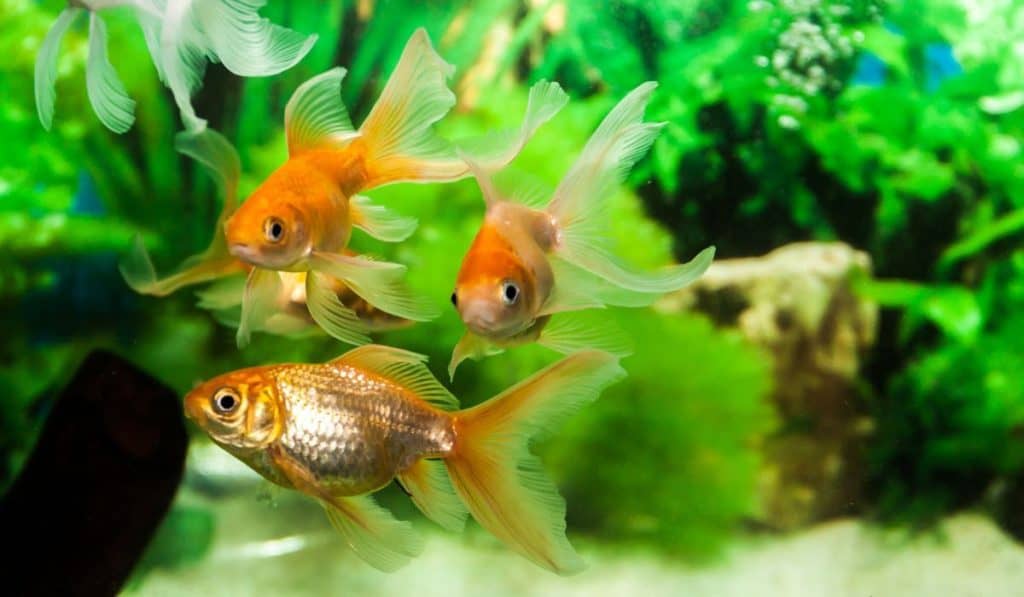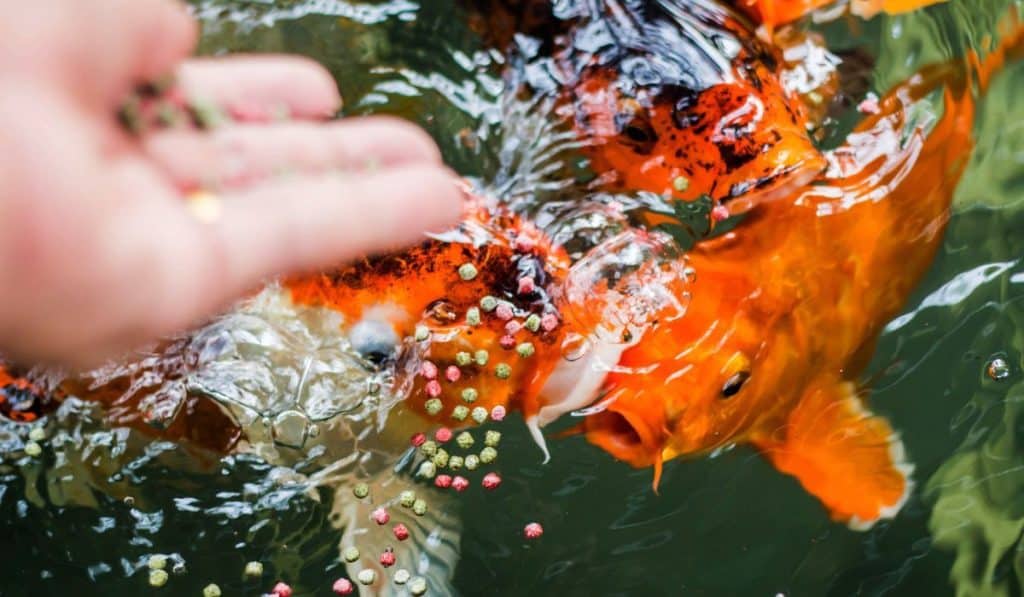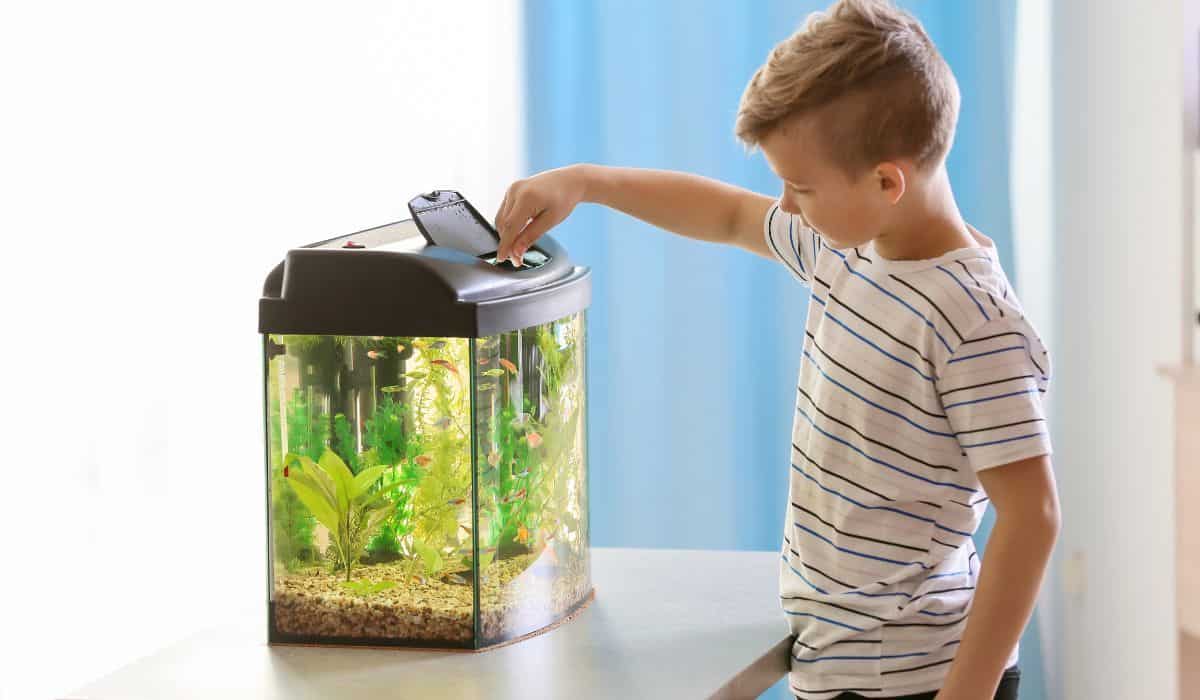Most tropical fish can survive on only one feeding per day. The surrounding temperatures of fish affect their metabolic rates.
The lower the temperature, the slower the metabolism meaning that digestion will take a longer time, especially for fish that constantly live in colder water temperatures.
Most aquarium fish will require feeding twice a day. Some saltwater fish will need feeding several times a day due to their specialist diet. Several smaller portions and a variety in their diet is essential to sustain life. But, the average aquarium or goldfish will be fine with twice a day.
Some aquariums like Aquascaped fish tanks don’t hold many fish at all. Therefore once a day is suitable. Often shoals or schools of smaller fish are used in these aquariums and they only need a small amount of dried flake food once a day and then some live foods to add variety to their diet.
What Type of Fish Do You Have?
The type of fish you have will also determine how often you should feed them. Most tropical fish are omnivores like Guppies, Gold Fish, Zebra Danios, and Mollies.
They have a developed digestive system and can stay for several hours without eating.
Once a day is good enough for them, but if you want to interact more with your fish, you can feed them twice while keeping the quantities low.
Herbivore fish like Silver Dollars and Farowellas do not have a stomach and can break down food fast.
Therefore, they are always hungry and often swim around the tank looking for whatever plant matter they can find.

You should feed these fish about three to four times a day in small quantities each time.
Do you have any newly hatched fry? Don’t assume that they shouldn’t eat much because they are tiny.
These little active fish should feed four to six times a day because their metabolic rates are high and are usually kept in warmer temperatures.
Also, they are babies and need all the strength and nutrition they can get.
On the other hand, larger, less active fish, will be satisfied with one feeding a day.
Nocturnal fish like Catfish, Knife fish, and Loaches hide during daylight and only come out to eat once at night.
Schedule or No Schedule?
Some fish owners will create a specific schedule. For example, the first feeding may be at 7 am and the second feeding at 7 pm.
At those particular times, the fish are always expectant for their next meal.
Schedules are great, but they aren’t that important to the fish. If you are usually busy, don’t let that put you off from keeping tropical fish.
Feed them at your convenience once or twice a day as long as the quantity is right. What matters to the fish is that they feed properly every day.
Signs that Your Fish are Hungry
Don’t give in to seemingly begging behavior. If your fish are fed at least once a day, they should be fine.
Fish may develop the tendency to swim close to the tank’s edge with their mouths open when they see you.
They’ll crowd around the glass, begging for food even when you fed them 10 minutes prior.
Many times fish act like they are hungry even when they are not.

If your fish are on a specific feeding schedule, whether it’s once or twice a day, they will get used to it, and if you miss a feeding, they’ll be hungry.
You’ll notice them digging around like they’re searching for something especially if it’s out of character for them to do so.
Your fish may be hungry because the quantity of food is insufficient even though you’re feeding twice a day.
If you notice sluggish movement or aggressiveness while gobbling food, it may be a sign of hunger.
It’s not just about the number of times you feed them. The quantity must be sufficient to meet their dietary needs.
Fasting Your Fish
Some owners fast their fish at least one day a week for a couple of reasons. First, they want to give the fish a semblance to living in nature.
Fish living in natural bodies can’t guarantee that they’ll find food every day.
Also, if the fish are constipated, the fast day gives them a chance to rest and clear their digestive systems.
Fasting may not be harmful to your fish, but it’s not necessary. As long as you’re giving them the right food in the correct quantities, they should be okay.
That said you’re better off skipping one day of feeding than feeding them more than they need as overfeeding will cause health problems.
When they overeat, they excrete much more waste than they usually would. The waste then releases nitrates and ammonia, which are toxic to fish.
Also, uneaten fish food that’s left in the fish tank will decay, clog your filter, reduce circulation, create even more toxins, and eventually kill your fish.
Final Word
If you’re going to be away for a weekend or a week-long retreat with nobody to feed your fish, don’t worry about starving them.
Healthy adult tropical fish have enough fat reserves to keep them going for almost two weeks.
Remember they have to have been feeding well regularly, meaning they’ll be healthy enough to endure that period without food. This is not to say that you should regularly skip your fish’s feedings – this is underfeeding, which will cause health problems.




